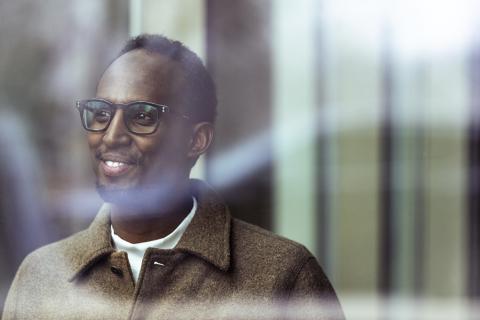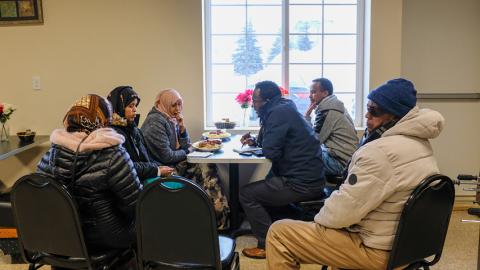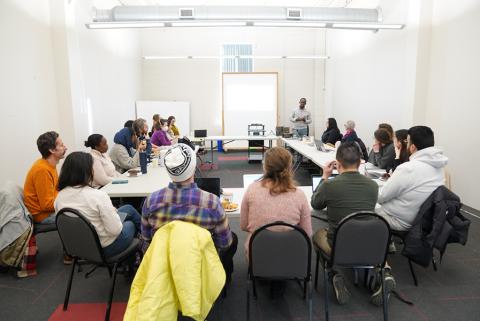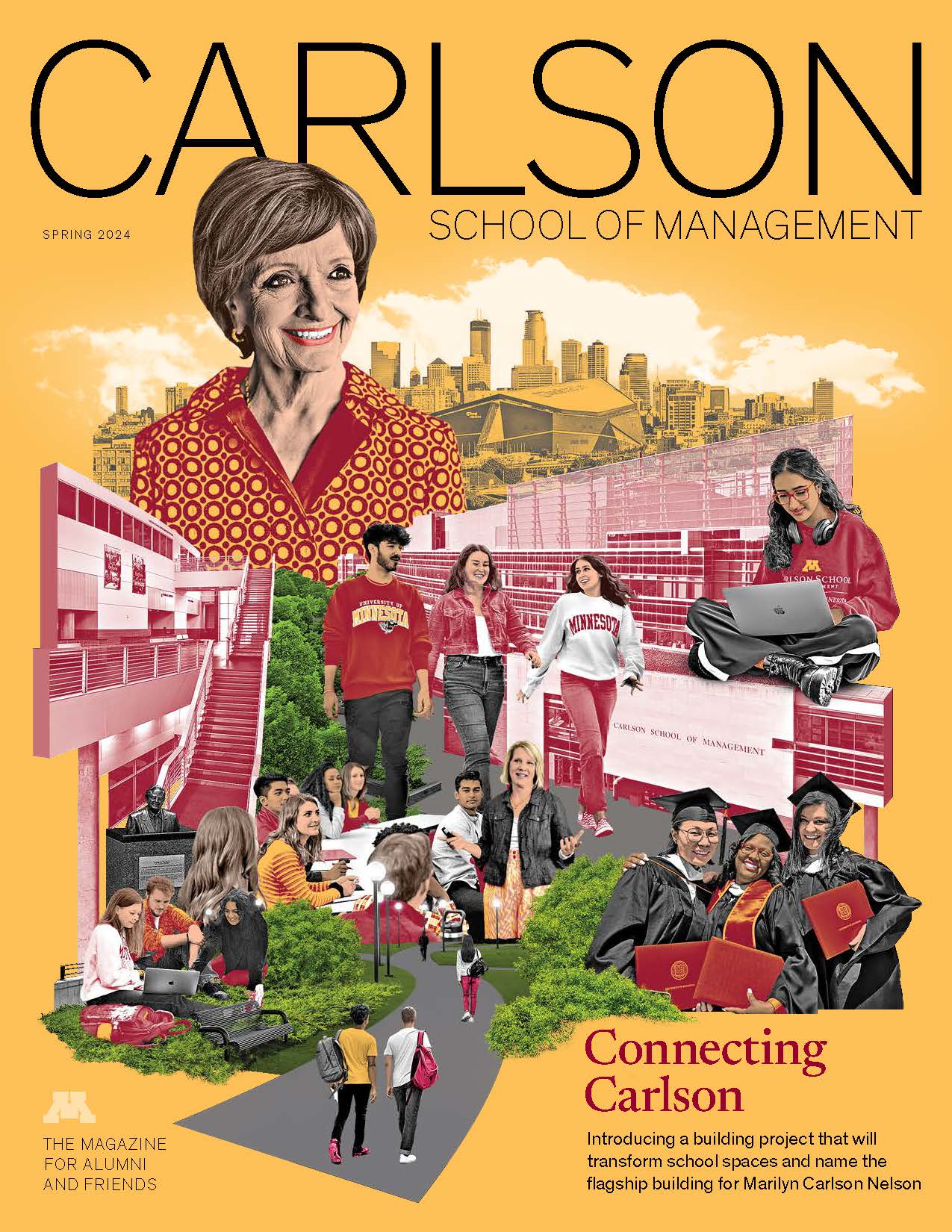
Mukhtar Ibrahim Reflects on Sahan Journal and MBA Journey
Friday, April 5, 2024
By Katie Dohman
The Victory Ramp in downtown St. Paul is a gritty concrete spiral, bookended with tollbooths to monitor comings and goings. In the early 2000s, Mukhtar Ibrahim was often the gatekeeper.
Located behind the St. Paul Pioneer Press’ former headquarters on Cedar St., he saw staffers buzzing in and out every day. It meant a newspaper was always available, and he read to pass the time.
“The paper was so thick then,” Ibrahim says, his voice tinged with nostalgia. Ramps weren’t yet equipped with self-serve tech, so Ibrahim interacted with drivers as they came and went. Journalism by proxy.
Those experiences ignited a passion for the profession. Now, Ibrahim is among the most influential media people in the region. He built the Sahan Journal from nothing to a 22-person—majority people of color—newsroom with a multimillion-dollar operating budget. Now, arguably at the top of his game, he announced he’s walking away, using his nearly complete MBA to undertake a new chapter. The obvious question is: Why? To answer that, you need context, something Ibrahim’s coverage offers in spades.
Noticing a Gap
Ibrahim and his family fled the civil war in Somalia and moved around East Africa before arriving stateside in 2005, when he was 17. After a year at St. Paul Central High School, he enrolled at Inver Hills Community College. The plan was to attend medical school. But, in part thanks to the tollbooth, his real passion was journalism.
As thrilling as seeing stories about his community in the newspaper was—and it really was, he says, noting The New York Times had a reporter stationed in Somalia—he noticed the vast majority of stories about Somalis, Somalia, and the diaspora covered only tragedy, violence, big events. Nothing about the daily successes, business, or culture of being Somali, here or abroad.
“It was a crazy moment if you were interested in journalism and consumed by it,” he says. He transferred to the University of Minnesota’s Hubbard School of Journalism and Mass Communication, earning a BA in 2011.
“With Minnesota changing, communities of color are becoming an integral part of our economy, culture, politics, and everything in between. They need these stories to be prioritized.”
Laura Yuen, now a features columnist with the Star Tribune, was Ibrahim’s mentor when he was in J-school. “When I first met him, he was all over social media, when Twitter was in its infancy,” she recalls. “He found a way to harness his following and make smart media commentary. It was from a viewpoint that hadn’t been heard from before ... Mukhtar was this young guy in college with a unique background, calling things as he saw them.”
After graduation, the young upstart found himself working alongside Yuen, who was then at Minnesota Public Radio (MPR). “Now, I’m no longer a news consumer,” he says. “I’m a journalist reporting. I’m part of the system.”
Learning the System
Ibrahim spent seven years at MPR, including as a general assignment reporter covering communities of color, learning from Yuen and others.
“If he sees a gap or opening or opportunity, he’s cornered it in the blink of an eye,” Yuen says. This well-honed instinct casts a sharp relief against his thoughtful, mellow energy, his relaxed body language, and his easy smile.
“I’ve been so impressed with his vision,” she continues. “He is a problem-solver. If no one’s filling that space, he’s going to take a stab at it. Everything about his life has been about incremental changes to give himself more knowledge, more understanding of a situation. ... He’s always set his eye on higher and higher heights.”
Ibrahim built his name, byline by byline. Then, in 2016, he received a Bush Fellowship, which comes with an award of $100,000. Most journalists are counseled away from pursuing a master’s degree, but Ibrahim was undeterred. He struck out for Columbia University to study investigative and data reporting. “As someone who’s interested in exposing systemic failures and wrongdoing and journalism that shines a light on issues that go unnoticed or unreported, it was the perfect program,” he wrote in a Bush Fellowship reflection. After graduation, he returned to cover Minneapolis City Hall at the Star Tribune. But it wasn’t enough.
“With Minnesota changing, communities of color are becoming an integral part of our economy, culture, politics, and everything in between,” he says. “They need these stories to be prioritized.” It became clear: This holistic, comprehensive coverage had to happen another way. He decided to start Sahan Journal, a nonprofit news organization focused on communities of color.
The Business of Words
His former colleagues at MPR believed in his vision so much that they gave him 18 months of salaried runway to launch. And they saved him a seat in the newsroom, should Sahan not become a “viable product.” They also provided people power: Yuen, plus other newsroom notables, contributed some of the first stories to the burgeoning organization.
Ibrahim says local foundations began investing, which meant he could hire freelancers and staffers and build infrastructure. Then came the one-two punch of 2020: The pandemic and the murder of George Floyd.
“That was a pivotal moment for us,” he says. It was the proving ground for the pitch. “Journalism contributes to the systemic problems we have been facing for centuries,” he says. “When the police release a statement, [and journalists take it] at face value ... that’s a big part of the problem. That’s what happens when you don’t hold people accountable.”
So like many working parents in the pandemic, he held a kid on his lap while tapping on a keyboard, balancing proving Sahan’s worth with parenting. He was also cramming books on business.
“No one taught me how to do this,” he says. “I took it upon myself to figure out those skills that I was never exposed to: Managing people. Creating financial statements. If you are an editor and editing copy, that’s different than managing humans and figuring that out in a healthy way.” In 2022, he enrolled in the Carlson School’s Part-Time MBA program, ready to learn business fundamentals.
Needing More
Sahan Journal was becoming something of a juggernaut: Publishing solid coverage, building cred from communities of color (and sometimes drawing criticism), convening the most diverse newsroom around, turning media heads, raising big fundraising dollars. By 2022, the GHR Foundation was considering its second gift—they are Sahan Journal’s biggest funder at more than $1.5 million.
“I immediately was drawn to [Mukhtar’s] brilliant mind and entrepreneurial spirit,” GHR program director Kevin Bennett says. “He was very deliberate with his words and expressed deep care for his family, his colleagues, and community that Sahan aims to serve. He also had a clear bias towards action.” Bennett says that people like Ibrahim and the impact of his leadership “reflects the potential that often remains unrealized without the capital to shift new ventures from surviving to thriving. We invested in the transformative change that he and Sahan represent.”
“We need more leaders of color capable of building and leading organizations. ... That requires us to make space for those people if they are not getting those opportunities in other places.”
He was hitting his stride, from the outside. But, after the birth of his fourth child in June of 2023, he looked around and realized: Things are stable and good. The MBA is almost done. Life with kids is moving pretty fast. Maybe now’s the time to pass the torch.
There was something else, too.
“We need more leaders of color capable of building and leading organizations,” he says. “I’m really interested in leadership development, so we’re not just rotating across newsrooms. What if we have more of us in this space? That requires us to make space for those people if they are not getting those opportunities in other places.” He also didn’t want Sahan Journal and Mukhtar Ibrahim to be synonymous terms. So, he announced his departure on October 30, 2023.
Since then, he’s helping lead the search for the right, next leader. The details for his future are materializing by the day. He wants to coach people to have healthy, thriving organizations where all feel safe to do their best work. He wants people of color to have the profiles and reputations they deserve. He wants corporations to do right by their social responsibility axioms. Consulting and coaching seem like the next best step.
“Given his incredible vision and success with Sahan, I have no doubt that we have only seen a glimpse of what Mukhtar is capable of,” Bennett says.
Though he can’t directly name it, Ibrahim carries the quiet confidence that something is simmering. “I want to take another risk, you know?”



